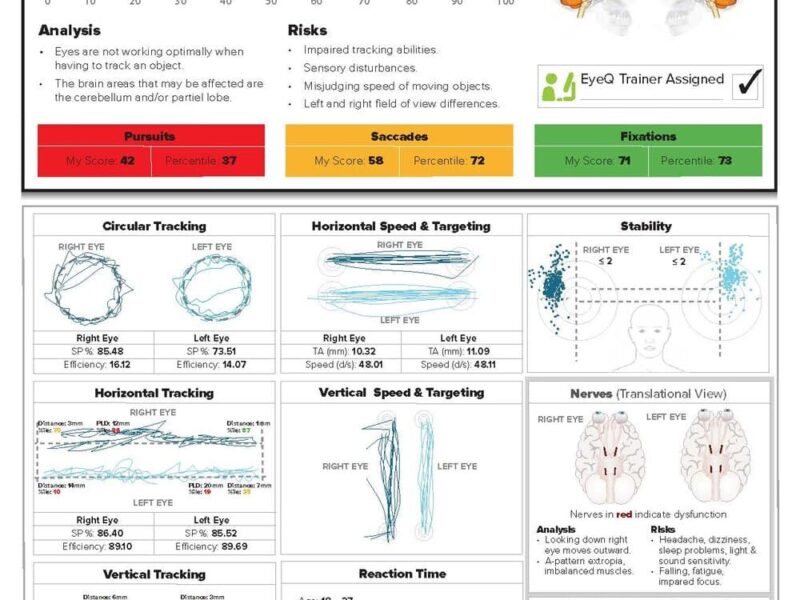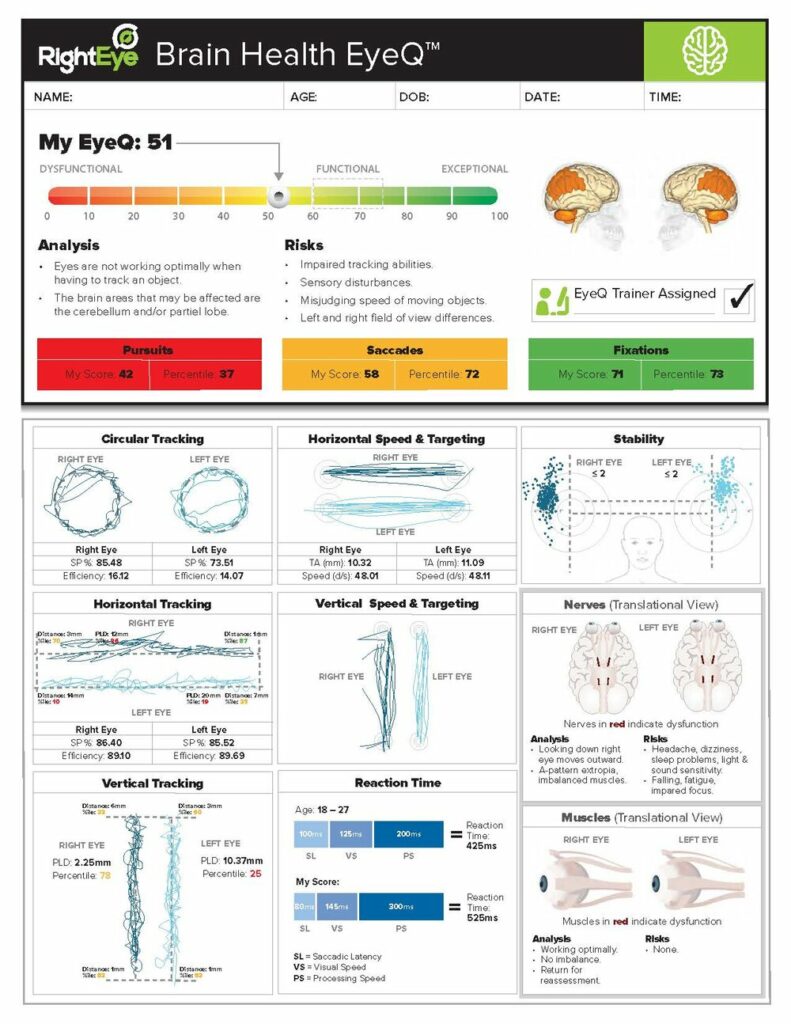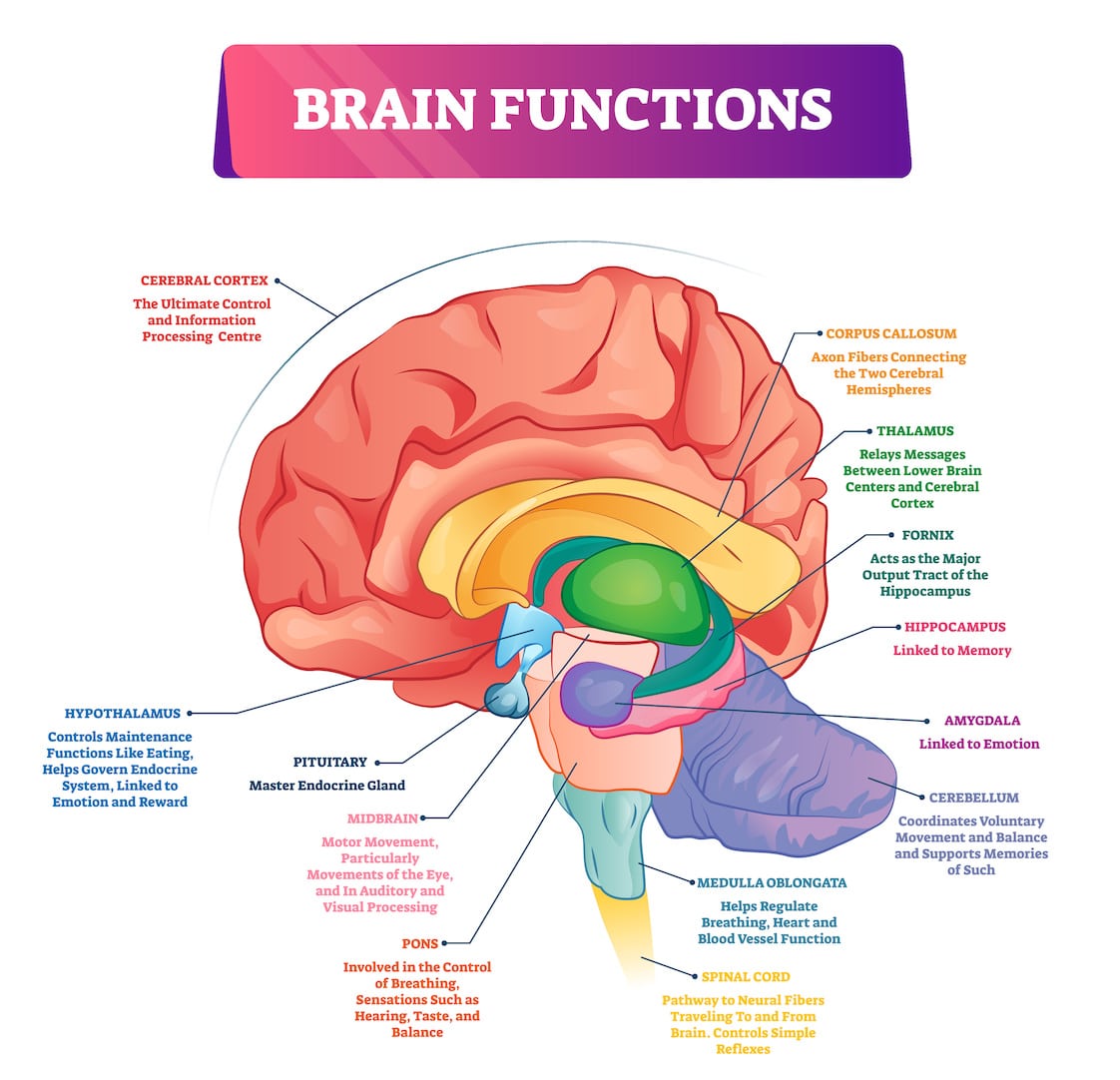Using RightEye to Determine Brain Health

Many ancient texts suggest that the eyes are windows to the soul, and in this sense, the term represent the focus of your life and what you are seeking. However, the medical community is discovering that our eyes might also be windows to the brain.
Increasingly, doctors — including those here at Restoration Healthcare — are examining vision, along with the retina and the optic nerve, in order to diagnose brain and central nervous system (CNS) disorders. These include Parkinson’s disease, Alzheimer’s disease, multiple sclerosis (MS), autism, schizophrenia, major depressive disorder, and acute brain trauma (such as concussions).
Examining the eyes to assess brain health certainly makes sense, because the retina and the optic nerve are outgrowths of the brain. During embryonic development, the retinas and optic nerves branch out from a part of the brain called the diencephalon. In some medical classification systems, the retina and optic nerve are actually considered parts of the brain.
However, vigorous brain health extends far beyond the eyes and the brain itself — it can affect other parts of the body as well, because the brain controls all bodily functions, voluntary and involuntary, including physical movement, heart rate, blood pressure, body temperature, breathing, the sleep-wake cycle, and digestion. It also plays an essential role in processing sensory information and controlling thoughts, emotions, and desires. In short, brain health is vital for our overall health, fitness, and emotional and psychological well-being.
Here at Restoration Healthcare, we evaluate brain health and function using a sophisticated diagnostic tool called RightEye’s Brain Health EyeQ Diagnostic. We also use RightEye’s EyeQ Trainer as part of our therapy to restore healthy brain function.
RightEye’s Brain Health EyeQ Diagnostic
The Brain Health EyeQ Diagnostic enables us to generate markers and collect valuable data that reflect your brain health and function. Vision is thought to require the use of about 80 percent of the brain’s neural pathways. The EyeQ Diagnostic uses eye movement to stimulate various regions of the brain while monitoring reactions to visuals displayed onscreen.
 An EyeQ examination is non-invasive, pain-free procedure that takes place at our Irvine clinic. During this 15-minute exam, you simply follow and respond to objects moving on a screen — it’s as simple as playing a video game.
An EyeQ examination is non-invasive, pain-free procedure that takes place at our Irvine clinic. During this 15-minute exam, you simply follow and respond to objects moving on a screen — it’s as simple as playing a video game.
An infrared camera built into the screen collects data related to your eye movements to gauge your “control of eye movement” accuracy and reaction times. The exam results give us metrics to evaluate the presence and severity of certain health issues ranging from acute brain trauma (such as concussion) to autoimmune conditions. It also enables us to determine whether all areas of the brain are working properly together as a whole (integration).
Brain-eye coordination is not optimal when the eyes need to move quickly. This may affect accuracy when targeting objects, resulting in hypermetria (overshooting) or hypometria (undershooting). These conditions may signal a condition called dysmetria, which is caused by dysfunction of the cerebellum — the part of the brain that regulates muscle activity and coordination. Poor brain-eye coordination may reflect other problems in other areas of the brain, as well, including the brain stem and frontal lobe.
For many of our patients, the EyeQ Diagnostic is part of our comprehensive initial new patient evaluation, and is one tool among the many diagnostics we use to root out the underlying cause of illness and dysfunction.
Symptoms to Watch for
Symptoms of brain dysfunction may not be noticeable, which is why the EyeQ Diagnostic is so useful — it can detect problems long before they become severe enough to start causing symptoms. However, if you experience any of the following symptoms, you should definitely schedule an evaluation:
- Fatigue
- Slow reaction times
- Slowed information processing
- Impaired executive function, which can result in lack of focus, inability to follow directions, or emotional lability (uncontrollable laughter or crying, heightened irritability, a quick temper, or impulsivity)
- Inability to multi-task
- Lack of mental clarity (brain fog)
- Reading difficulties
- Inability to complete tasks in a timely manner
Concussion and Other Traumatic Brain Injuries (TBIs)
If you have suffered a concussion or other acute traumatic brain injury (TBI), or you suspect that you may have suffered such an injury, we encourage you to come in for an EyeQ Diagnostic evaluation.
Even if you have not experienced a TBI or cognitive difficulties, you should have your brain/CNS function tested every few years, because brain health impacts the health and function of every system in your body. A simple 15-minute EyeQ Diagnostic may reveal underlying health conditions that would otherwise remain undetected and untreated.
– – – – – – – – –
Disclaimer: The information in this blog post about brain health testing using RightEye, is provided for general informational purposes only and may not reflect current medical thinking or practices. No information contained in this post should be construed as medical advice from the medical staff at Restoration Healthcare, Inc., nor is this post intended to be a substitute for medical counsel on any subject matter. No reader of this post should act or refrain from acting on the basis of any information included in, or accessible through, this post without seeking the appropriate medical advice on the particular facts and circumstances at issue from a licensed medical professional in the recipient’s state, country or other appropriate licensing jurisdiction.


